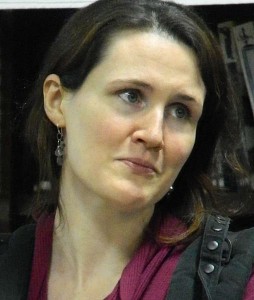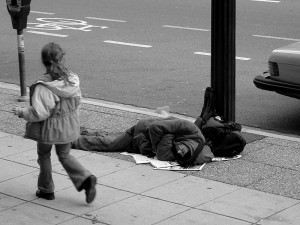 By Jamie Bieber and Katie Matta
By Jamie Bieber and Katie Matta
People do not need to possess superpowers to be heroes. All humans are equipped with the ability to summon up the necessary resilience and resourcefulness to overcome adversity, and in extreme cases these efforts can be a heroic inspiration to us all. No one illustrates this idea better than Liz Murray, who transformed herself from being a homeless person into a Harvard graduate.
Born to loving, yet drug-addicted parents, Liz Murray suffered through a turbulent childhood in which most of the money that came into the household was spent on drugs. Murray recalls moments where her mother stole her birthday money, the Thanksgiving turkey, and the family television for cocaine and heroine. Lacking basic resources such as clean clothes and food, Liz Murray had to learn at an early age how to shoplift.
Due to her poor circumstances and having to care for her sick mother, Murray attended school irregularly. Soon her mother died of AIDS, and then her father abandoned her and her sister. The two children had no choice but to live in a homeless shelter. There seemed to be no future for either of them.
Despite these dire circumstances, including hunger and homelessness, Liz Murray chose to structure her life around education. She made the decision that she would become a straight A student and graduate from high school. Sleeping on underground trains, park benches, and her friend’s couch, Liz Murray studied for exams anywhere that  she could. She overcame the downward trajectory that many teenagers in her situation follow by believing that every day represented an opportunity for growth.
she could. She overcame the downward trajectory that many teenagers in her situation follow by believing that every day represented an opportunity for growth.
As a result of her hard work, Murray managed to win the New York Times scholarship for kids in need and, with the help of a dedicated high school teacher, was accepted into her dream school, Harvard University. As her heroic story was passed along to Oprah Winfrey and other sources, the media promoted her heroic story to mass audiences. The cable TV channel Lifetime produced an original movie re-creating her heroic journey.
In their research on heroism, psychologists Scott Allison and George Goethals have found that heroes typically excel in the areas of morality, competence, or both. As a teenager and young adult, Murray distinguished herself on the heroic dimension of competence by dedicating her life to receiving an education. After she graduated from Harvard, she began to show great morality by using her success to inspire others to follow their dreams.
She wrote a book describing her harrowing upbringing and her decision to prevail over her circumstances. Her autobiography is aptly subtitled, A Memoir of Forgiveness, Survival, and My Journey From Homeless to Harvard. The book speaks to all of us by teaching us that anything is possible if you make every day count toward achieving our goals.
Liz Murray is also a hero for sharing her story in her role as a motivational speaker. The focus of her speeches is on helping children and teens avoid drug addiction and gangs, and to strive to complete their education. On her Facebook page, she describes herself as “a believer of possibilities, creativity, audacity, passion, fun, and a global community.” This could be the motto of all heroes.
Below is a clip of Liz Murray describing her story.
– – – – – – – – – – – – – – – – – – – – –
Jamie Bieber and Katie Matta are undergraduate students at the University of Richmond. They wrote this essay as part of their course requirement while enrolled in Dr. Scott Allison’s Social Psychology class.